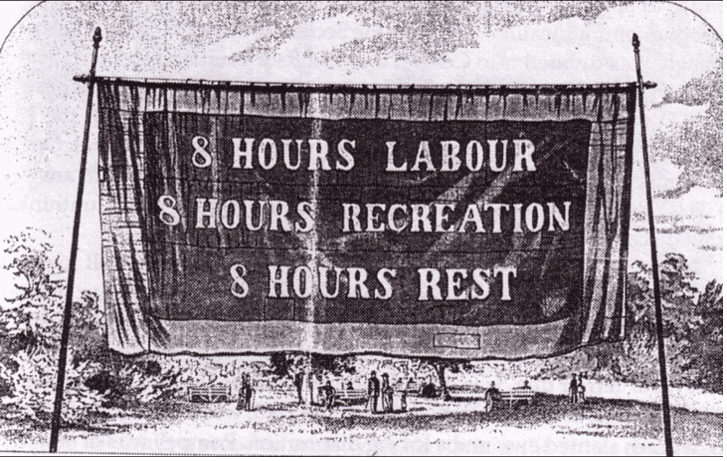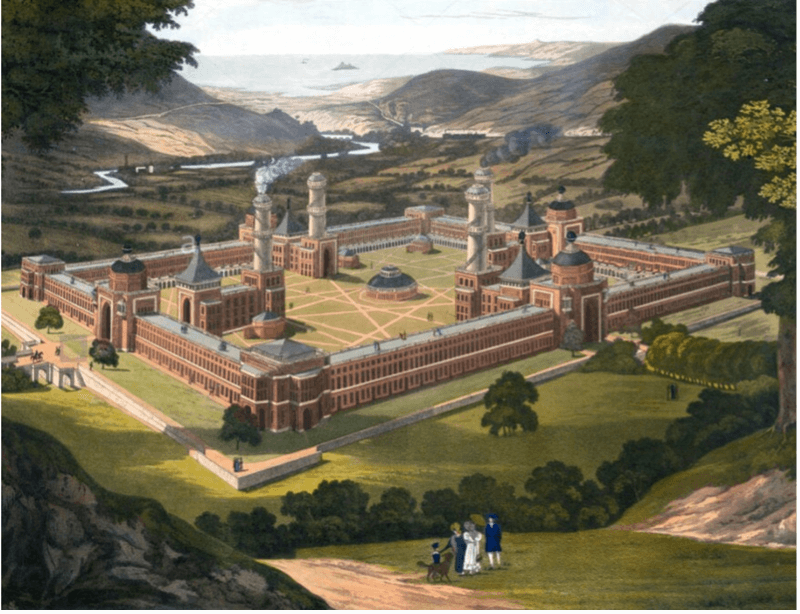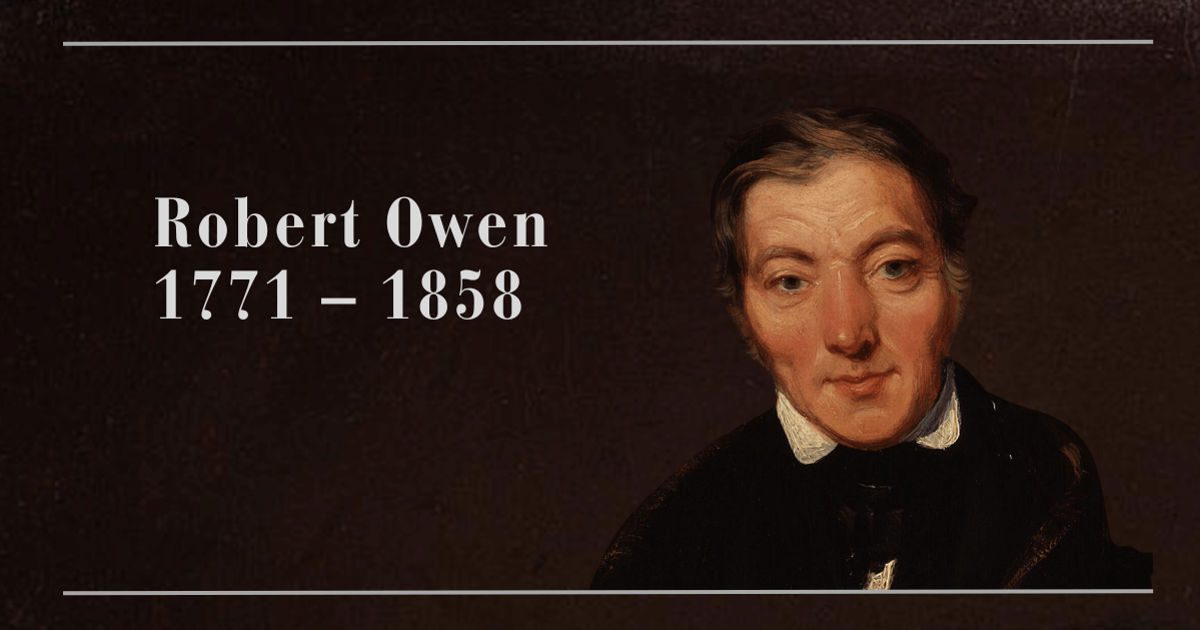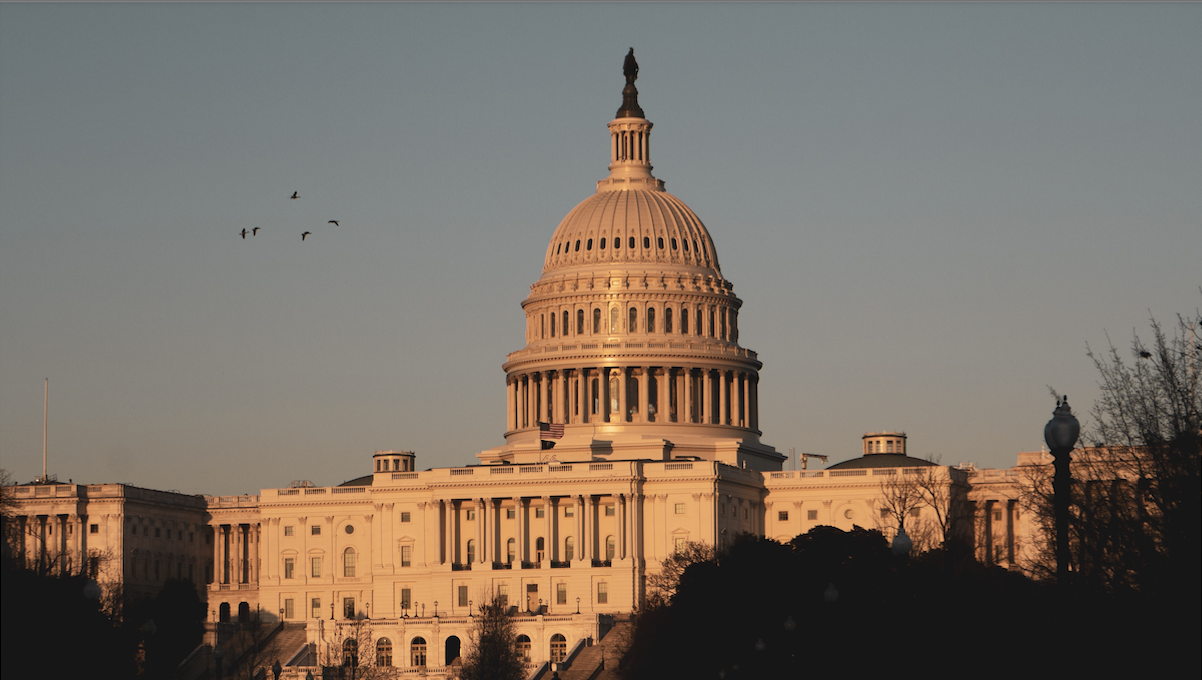By Elise DeYoung
“Society may be formed so as to exist without crime, without poverty, with health greatly improved, with little, if any misery, and with intelligence and happiness increased a hundredfold, and no obstacle whatsoever intervenes at this moment except ignorance to prevent such a state of society from becoming universal.”
This utopian prediction was made by the world’s first true socialist—Robert Owen.
Born in Wales on May 14, 1771, Robert Owen’s childhood was rather uneventful according to the standard upbringing of children in the 18th century. His hard-working father worked multiple jobs to support his wife and seven children, and like his peers, Owen was sent to a school that emphasized moral instruction above the teaching of reading, writing, and arithmetic.
Owning largely to his knack for entrepreneurship, Owen became the manager of New Lanark, his father-in-law’s factory, at age 28. During his time in management, he became widely known for improving work conditions, providing opportunities for his employees, and increasing the productivity of his factory. His official slogan became “8 hours labor, 8 hours recreation, 8 hours rest.” This was a stark comparison to the 10–16 hours of work that children and adults alike were accustomed to.

With this reputation and list of accomplishments, Robert Owen’s future looked bright and promising. Such a background does not commonly lead a person to become a utopian, spiritualist, communist—but as the Scriptures say, “Do not be misled: “Bad company corrupts good character.” 1 Corinthians 15:33
The Idea
In 1793, a bright-eyed and progressive Robert Owen joined the Manchester Literary and Philosophical Society. Known today as Manchester Lit & Phil, this group of thinkers and theorists gathered together with the goal of attaining the end of progressivism, which is a globalized utopia. Far from being a casual attendee of these meetings, Robert was one of its leaders. Today, he is still recognized on the Manchester Lit & Phil website as “The father of the co-operative movement.”[1]
Briefly put, the Co-operative Movement was birthed out of the progressive movement and was the first infant school that emphasized character over moral instruction. This is the complete inverse of the schooling Owen had experienced as a child. His school even went as far as dismissing all moral teaching in favor of the instruction of dance and music. It was during this time that Owen adopted the views that he would hold for the majority of his life.
Robert Owen believed that all religion, specifically Christianity, was the stumbling block of social utopia and therefore, must be destroyed. He rejected individualism and worked to uphold social collectivism. He renounced the right to private property and was the first to call for free, public education as a means to establish a global utopia. Simply put, Owen was a good communist and a loyal atheist.
Interestingly, he would not have called himself a “communist” simply because the renowned Communist Manifesto had not yet been published. But regardless of the title, Owen had adopted the very ideas that would kill almost 100 million people in the 20th century alone.
He had one other idea that must be understood in order to grasp the “why” and “how” of his later actions.
Even more importantly than understanding his communist views or anti-religious beliefs, we must recognize that Robert Owen was a utopian. Utopians have one simple premise that undergirds all of their reasoning: human beings are shaped purely by their environments, not by nature. Or, as Owen put it, “Man is a creature of circumstances.”
This premise leads to the following argument:
All humans are products of their environment.
Utopias are concerned with perfecting humanity.
Therefore, Utopians are responsible for perfecting the environment of humans.
To Christians who acknowledge the reality of sin nature, there is a clear problem with this thinking. The utopian argument puts the responsibility of perfecting humanity into the hands of imperfect men. Regardless, Owen, who rejected the Christian worldview, applied himself to perfecting the human race by attempting to perfect their environment.
New Harmony
By 1825, Robert Owen had left Europe and arrived in the United States of America with the aim of creating the perfect communist society. He purchased a piece of land in Indiana and named it New Harmony.

Though this image of New Harmony looks beautiful, I cannot help drawing a comparison between its great red walls and the cold, deadly red walls of the Kremlin in Communist Russia.
It was here that Robert applied his theories to the lives of other people. Consequently, the socialist motto “You will own nothing and be happy” was universally applied at New Harmony. There was no organized religion (though the citizens were able to personally practice whatever religion they chose), and there was no centralized authority in the government; rather, decisions were made in committee. Throughout its brief existence, 500–1,200 people lived in this radically progressive society.
Owen also established many social “firsts” in his communist commune, including the first public library, the first public civil drama club, and the first public school system.
In this supposed utopia, children were kept with their families until age three, when they would be handed over to the populous to be raised, educated, cared for, and trained to be productive members of society.
Tasks and jobs were divided up by age, not skill set or ambition. Children, along with adults, worked the whole day long and only saw their families at mealtimes.
Is this a Utopia?
Owen had successfully disjointed the traditional structure of civilization. No family, no private education, no private property, no organized religion, no accountable government structure—in other words, utopia, right?
Wrong—very wrong. The problem with Owen’s theory is that it can only work in the mind of a madman.
Within two years, New Harmony collapsed. The capitalists say it was because people are not happy when they own nothing; the liberals say it was because New Harmony just needed more money so the committee could care for the populace; the conservatives say it was because the family unit was dissolved; the Christians say it was because of a lack of religious fervor.
Each of these factors may have played a part in the downfall of utopia, but Robert Owen rationalized his failures in a different way.
Because he was a loyal communist, New Harmony did not cause his convictions to sway. Rather than admitting that New Harmony was a destructive idea from the start, he reasoned that it must have failed because the members of his communist society had not been properly conditioned and educated to live in a utopia. He truly took his own advice when he said, “Never argue. Repeat your assertion.” That is exactly what he did.
“The thinking was that the commune failed not because of anything wrong with communism or collectivism, but because the people living there had not been properly socialized and ‘educated’ to be collectivists from childhood.”
Alex Newman, Indoctrinating Our Children to Death
From then on, Robert Owen applied himself to convincing his fellow theorists that if utopia is to be established, the population must be educated to accept communism. Therefore, all efforts should be made to design, establish, and control a public school system.
“To train and educate the rising generation will at all times be the first object of society, to which every other will be subordinate.”—Robert Owen.
Suddenly, the public schools were born.
The Prussian Public Schools
“According to Owen’s account, the Prussian ruler had “so much approved” of these ideas that he ordered his own government to create a national education system based upon them. And thus, the Prussian system of education—schooling of the state, by the state, and for the state—was officially born.”
Alex Newman, Indoctrinating Our Children to Death
In 1843, a man named Horace Mann traveled to Prussia and observed the public school system—which had been directly inspired by Owen. He instantly recognized the potential of the government overseeing the instruction of all future generations, so he instantly began working in the United States to see this very system implemented in the West.
Ultimately, thanks to the work of men like Horace Mann, John Dewey, and Herbert Marcuse, the schemes of Robert Owen were quickly and eagerly implemented in the freest country on earth.
The Legacies
After his failed American experiment, Robert Owen returned to England as a disgraced and broke man. Having sunk 80% of his wealth in New Harmony, he relied on his children for support until he died in 1858.
Before then, however, Owen also founded the National Equitable Labor Exchange in 1832. This was a union that sought not only to reform the working system but to upend and remake it all together through social transition. Does this sound at all familiar?
Also, before his death, Owen, who had been a staunch atheist all his life, converted to spiritualism in 1854 after meeting with Maria B. Hayden, the first witch to visit England after the awakening of spiritualism in the United States. Later on, he claimed to have communicated with Thomas Jefferson and Benjamin Franklin via spiritual mediums. He believed they urged him “to prepare the world for universal peace and to infuse into all the spirit of charity, forbearance, and love.”
Interestingly, 13 years after his death in 1871, Robert’s son, Robert Dale Owen, claimed to have been visited by his father, who said he would share a set of “spiritual commandments” through a woman named Emma Hardings Britten, who was a supposed “spiritual medium.” These “spiritual commandments” were written down and are to this day are taught as the Seven Principles of Spiritualism.
His legacy also continued in the life of his son, Robert Dale Owen, who stayed in New Harmony after his father left. He later became a US Representative and helped found the Smithsonian Institute.
When reflecting on his life, Robert Owen said this: “My life was not useless; I gave important truths to the world, and it was only for want of understanding that they were disregarded. I have been ahead of my time.”
Happily for Owen and regretfully for mankind, time would catch up rapidly. Today, Americans are blissfully ignorant of the deceptive and unsuccessful roots of the public school system and send children off to the yellow school bus, completely unaware that the bus is there to advance the ends of a loyal communist and committed spiritualist.
As Alex Newman said, “History would gradually be forgotten as the rotten fruit of this system began to undermine traditional American values and ideas.”
The question that demands to be asked is, have we seen the utopian world promised to us by Robert Owen? The honest answer is absolutely not. So, rather than trying to revive New Harmony, I suggest that we check our premises before our society too collapses.

Elise DeYoung is a Public Relations and Communications Associate and a Classical Conversations® graduate. With CC, she strives to know God and make Him known in all aspects of her life. She is a servant of Christ, an avid reader, and a professional nap-taker. As she continues her journey towards the Celestial City, she is determined to gain wisdom and understanding wherever it can be found. Soli Deo gloria!
[1] Manchester Lit and Phil (n.d.). Our History. Manchester Lit & Phil. Retrieved August 2, 2024, from https://www.manlitphil.ac.uk/about-us/our-history/


